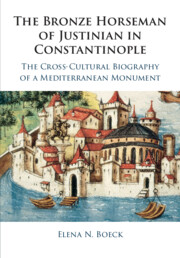 The Bronze Horseman of Justinian in Constantinople
The Bronze Horseman of Justinian in Constantinople Book contents
- The Bronze Horseman of Justinian in Constantinople
- The Bronze Horseman of Justinian in Constantinople
- Copyright page
- Contents
- Figures and Maps
- Tables
- Acknowledgements
- Abbreviations
- Note on Transliteration and Naming Conventions
- Selected Timeline of the Triumphal Column of Justinian and Its International Reverberations
- Map of Constantinople
- Introduction
- 1 Justinian’s Entry into Constantinople: He Came, He Saw, He Conquered
- 2 The Making of Justinian’s Forum
- 3 Defying a Defining Witness: the Bronze Horseman and the Buildings (De Aedificiis) of Prokopios
- 4 The Horseman of Baghdad Responds to the Horseman of Constantinople
- 5 Soothing Imperial Anxieties: Theophilos and the Restoration of Justinian’s Crown
- 6 Debating Justinian’s Merits in the Tenth Century
- 7 The Bronze Horseman and a Dark Hour for Humanity
- 8 The Horseman Becomes Heraclius: crusading Narratives of the Eleventh and Twelfth Centuries
- 9 From Exile in Nicaea to Restoration of Constantinople
- 10 A Learned Dialogue across the Ages: Pachymeres Confronts Prokopios
- 11 Orb-Session: Constantinople’s Future in the Bronze Horseman’s Hand
- 12 Justinian’s Column and the Antiquarian Gaze: a Centuries-Old “Secret” Exposed
- 13 A Timeless Ideal: Constantinople in Slavonic Imagination of the Fourteenth–Fifteenth Centuries
- 14 The Horseman Meets Its End
- 15 Horse as Historia, Byzantium as Allegory
- 16 Shadowy Past and Menacing Future
- 17 After the Fall: the Bronze Horseman and the Eternal Tsar’grad
- Postscript: the Horseman’s Debut in Print
- Select Bibliography
- Index
13 - A Timeless Ideal: Constantinople in Slavonic Imagination of the Fourteenth–Fifteenth Centuries
Published online by Cambridge University Press: 08 April 2021
- The Bronze Horseman of Justinian in Constantinople
- The Bronze Horseman of Justinian in Constantinople
- Copyright page
- Contents
- Figures and Maps
- Tables
- Acknowledgements
- Abbreviations
- Note on Transliteration and Naming Conventions
- Selected Timeline of the Triumphal Column of Justinian and Its International Reverberations
- Map of Constantinople
- Introduction
- 1 Justinian’s Entry into Constantinople: He Came, He Saw, He Conquered
- 2 The Making of Justinian’s Forum
- 3 Defying a Defining Witness: the Bronze Horseman and the Buildings (De Aedificiis) of Prokopios
- 4 The Horseman of Baghdad Responds to the Horseman of Constantinople
- 5 Soothing Imperial Anxieties: Theophilos and the Restoration of Justinian’s Crown
- 6 Debating Justinian’s Merits in the Tenth Century
- 7 The Bronze Horseman and a Dark Hour for Humanity
- 8 The Horseman Becomes Heraclius: crusading Narratives of the Eleventh and Twelfth Centuries
- 9 From Exile in Nicaea to Restoration of Constantinople
- 10 A Learned Dialogue across the Ages: Pachymeres Confronts Prokopios
- 11 Orb-Session: Constantinople’s Future in the Bronze Horseman’s Hand
- 12 Justinian’s Column and the Antiquarian Gaze: a Centuries-Old “Secret” Exposed
- 13 A Timeless Ideal: Constantinople in Slavonic Imagination of the Fourteenth–Fifteenth Centuries
- 14 The Horseman Meets Its End
- 15 Horse as Historia, Byzantium as Allegory
- 16 Shadowy Past and Menacing Future
- 17 After the Fall: the Bronze Horseman and the Eternal Tsar’grad
- Postscript: the Horseman’s Debut in Print
- Select Bibliography
- Index
Summary
Before and after the fall of the Byzantine capital in 1453, Orthodox Slavic rulers imagined Constantinople as an ideal imperial capital and an icon of Orthodox empire. While the physical city was dramatically declining in the fourteenth and fifteenth centuries, it remained iconic. An imperial ideal was materialized in the ensemble of two architectural monuments – Hagia Sophia and the horseman. Hagia Sophia and the horseman were the interconnected memory sites of Constantinople. Their gigantic size and physical proximity united them as breathtaking manifestations of a sacralized Orthodox capital of a bygone age. Though this image was promoted by Palaiologan fundraising campaigns of the fourteenth century, it continued to flourish in Slavic lands long after Byzantium ceased to exist. By analyzing the illustrated history created for Ivan Alexander of Bulgaria in the mid-fourteenth century, the narratives of Russian pilgrims and church officials, and the Slavic version of the Narrative on the Construction of Hagia Sophia, I demonstrate how Slavic Orthodox rulers constructed an image of a timeless, sacred city. While for Ivan Alexander Constantinople was a political, historical place, for Russian observers Constantinople became a timeless, sacral entity.
Keywords
Information
- Type
- Chapter
- Information
- The Bronze Horseman of Justinian in ConstantinopleThe Cross-Cultural Biography of a Mediterranean Monument, pp. 293 - 316Publisher: Cambridge University PressPrint publication year: 2021